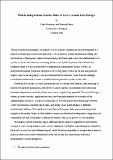|
Reseña:
|
Reseña:The rule of law is increasingly considered to be a necessary condition for the development of a market economy and a successful democracy. The creation of a stable institutional setting, the introduction of transparent, well-formulated and predictable legal norms, the establishment of a system of checks and balances restraining the exercise of political power, have all been the preferred target of policies promoted by international organizations. In this context, an independent judicial system has emerged as one of the pillars of the rule of law. Independent judges – and, as we are going to see, also independent prosecutors – have been increasingly considered fundamental in order to establish and implement a system of fair rules.However, the concept of courts’ independence is not always well defined, often referring to related but different phenomena. Moreover, to a more careful consideration, the relationship between independence and rule of law seems more complex than expected. The case of Europe – where, in recent decades, significant reforms have been implemented in the realm of the administration of justice - is a good case in point. In Western Europe the relationship between courts’ independence and the rule of law is not always clear, maybe thanks to different institutional traditions. The new Eastern and Central European states can provide important insights in the matter, thanks to their relative common institutional development: a long period of communist rule and a transition to democracy which is still in the process of consolidation.The analysis carried out in this paper, although still incomplete, suggests not only that the concept of courts’ independence needs a better definition, but that its main dimensions should be taken into account for their different impact: while the external gradient of independence seems to play a positive role for the development of the rule of law, the contribution of internal independence is more ambiguous.The rule of law is increasingly considered to be a necessary condition for the development of a market economy and a successful democracy. The creation of a stable institutional setting, the introduction of transparent, well-formulated and predictable legal norms, the establishment of a system of checks and balances restraining the exercise of political power, have all been the preferred target of policies promoted by international organizations. In this context, an independent judicial system has emerged as one of the pillars of the rule of law. Independent judges – and, as we are going to see, also independent prosecutors – have been increasingly considered fundamental in order to establish and implement a system of fair rules.However, the concept of courts’ independence is not always well defined, often referring to related but different phenomena. Moreover, to a more careful consideration, the relationship between independence and rule of law seems more complex than expected. The case of Europe – where, in recent decades, significant reforms have been implemented in the realm of the administration of justice - is a good case in point. In Western Europe the relationship between courts’ independence and the rule of law is not always clear, maybe thanks to different institutional traditions. The new Eastern and Central European states can provide important insights in the matter, thanks to their relative common institutional development: a long period of communist rule and a transition to democracy which is still in the process of consolidation.The analysis carried out in this paper, although still incomplete, suggests not only that the concept of courts’ independence needs a better definition, but that its main dimensions should be taken into account for their different impact: while the external gradient of independence seems to play a positive role for the development of the rule of law, the contribution of internal independence is more ambiguous. |

